#Fan analysis
Explore tagged Tumblr posts
Text
the way patrick zweig is so clearly a creature of desire; so fundamentally hungry. always devouring, uncaring of how desperate he might appear for it—taking a bite of the line judge's bagel sandwich before he even sits down; scarfing down his hotdog before grabbing a bite of art's, and then later treating their churros exactly the same way; picking the cigarette that tashi slapped out of his mouth up off the literal alleyway street so he can finish smoking it. acting on his hungers without asking permission first.
the way art donaldson is comfortable expressing desire without acting on it; content to yearn. mr. i-do-what-she-says-and-then-i-win obediently drinks his green juices, his electrolyte mixes; he lays his heart on the table for tashi, twice, and lets her decide when to take it; he tells her he wants to kiss her, but then lets her come to him to actually do it. a lapdog, just like patrick says: he'll turn his pleading eyes to you, desire writ across every line of him, but he is too well-bred to ever snap and just take.
....except, of course, with patrick; but even then, only when he can sublimate his desire for patrick into the appearance of desire for another woman. snapping at the churro when patrick calls him out over sowing doubt in his relationship with tashi is the obvious one, but also the fact that art is the one to come first in their mutual-masturbation experience when talking about kat zimmerman (how much of it was because of miss zimmerman and how much of it was art letting himself imagine patrick with her?). patrick, in the churro scene, describes it as seeing art "lit up about something," and while he's not wrong i think it's more specific than that. art feels deeply, keenly, but he guards the flames of his desire so carefully; banks them down and keeps the embers glowing for years. tashi is content to meet art halfway, to take the quiet longing invitations he extends. patrick is not. his desire, his hunger, is bigger than that. he wants to see sparks fly. how perfect, then, that he is the only one who can bring that out of art. he does exactly that with the racket-neck signal, and art (once he's over his shock) is once again lit up; ready to take the win, not to have it handed to him.
the way tashi duncan understands them both, perfectly, from their very first night in that hotel room that was so formative for all three of them. she kisses art first, because she already knows that if she kissed patrick first, art would take that as a rejection and retreat; put his desire away. she kisses art first because she knows patrick will not give up on his own desires that easily. she understands how to stoke art's desires and how to temper patrick's and teach him patience. and because of that, she gets them both: she doesn't have to choose.
#challengers#challengers meta#patrick zweig#art donaldson#tashi duncan#fan analysis#challengers analysis#my post#text post#v speaks#character analysis
1K notes
·
View notes
Text
Tim is an excellent fighter…but he’s not the best.
He’s great with computers…but Oracle could outhack him.
He’s an amazing detective…but Batman is still the best.
No. What Tim brings to the table is that he’s absolutely, incredibly unhinged. Like—all Batfamily members are, but Tim has a unique brand of crazy. His brain goes problem —> solution, without any filter of “is this a logical, sensible plan?”
Tim will take so many insane things in stride. Did he set out to become Robin? Nope, but he’s Robin now! Oh, he met Lady Shiva? Well, she’s terrifying, but he does need to learn fighting while trying to defeat this powerful villain who appeared and is way out of his league. And then there’s the entirety of Young Justice. Tim sees one (1) portrait, concludes that Bruce must be lost in time, and then spends a year of his life on this hunch—and he’s correct. Oh, Ra’s al Ghul wants to talk to him? Well, that’s fine, he’ll just chat with the immortal cult leader while becoming an international art thief. He acknowledges that his life is crazy, but he doesn’t let that stop him!
This sort of reminds me of that old Batman movie where Batman and Robin come up with the most ridiculous answers to the Riddler’s riddles (a ballpoint banana, anyone?) and they’re right. Tim is just tapped into the DC universe’s insanity.
939 notes
·
View notes
Text
Bachira and Isagi’s Relationship is Doomed (Theory):
With the NEL arc having ended, we’ve seen Isagi “sell his soul”. While to me, what this entails in full is still somewhat unclear, one thing is a abundantly apparent: Isagi is losing the sentimentality he once carried for fútbol. He states it himself- in order to survive as a “talented learner” in a world of geniuses with God-given talents, he needs to become a machine. To claw his way to the top, he can’t just ride along the high of his own abilities anymore. No matter how great he can become, there will always those who with random, natural gifts, like Noel and Loki. No matter how hard he fights, the randomness of fate, luck and genetics will override his efforts simply by existing. Now his only purpose is “absolute victory” at all costs, even if it means sacrificing the fundamentals of what being a egotistical striker once meant to him.


How does this relate to Bachira? To start, his and Isagi’s play styles have always been polar opposites. Isagi uses his analytical skills to make up for his lack of notable physicality, while Bachira relies on his dribbling and off-brand instincts, following the unique, sporadic ideas that spur from his monster. However, the two still inherently understand and complement each other from their shared passion. Despite taking the ruthless journey to become number one, they share a love for the game and each other. They want to see each other improve and feed off of each other’s egos. This is why Isagi fills (filled?…) the void of Bachira’s monster. Their greatest strengths are also their greatest weaknesses, too- Isagi feeling like a second fiddle sheep for his lack of physical gifts, and Bachira’s crazy visions never being understood, isolating him from others- they balance each other out that way.


However, the passion they both once shared has fundamentally changed. Isagi most likely will not view the way he can grow off Bachira’s development in the same light. He won’t view any other players’ talents being steppingstones for his own in the same manner, either. Now, he must take in everything around him like a computer, nothing has personal can be at stake for him anymore, and no relationships can serve him beyond what lies directly in front of him. The sentimentality he and Bachira once he does not serve his new nihilistic mindset. If all the hard work in the world can be outdone simply by lucky genetics, is it even worth it? To outdo fate itself and become the best striker in the world, he has to sacrifice the hope and passion he once shared with Bachira. To make nothing off-limits to win, nothing has to be off-limits to lose, except for total victory itself. Thus, he has to destroy all personal and emotional connections in the game, as they can inherently be a weakness to be exploited; that’s what he’ll be thinking, at least.
We can see this loss of enthusiasm shown in how he refers to himself in the first vs third person at the end of the U-20 vs Japan / NEL arcs respectively. Yoichi Isagi is no longer the scrappy underdog using only his mind to make it up the ranks, he is now the face of the multi-billion dollar soccer corporations, dominating everything that gets in his way. Even to himself, he is just a product, a variable that must be used in whatever way is most optimal to win (16 y/o btw). The bright enthusiasm and determination in his eyes have dulled, being replaced with a cold, distant stare. Instead of the hope he carries for Japan being represented by him in jersey, he is dressed up and is “presentable”, as the only thing on his mind is the business of total victory. The sins of his choices literally surround him, encasing him in darkness, in comparison to the enlightening hope he once carried.


This is not what he bonded over with Bachira. Bachira has assumedly remained true to himself during the NEL, honing in his skills, creativity and ego while still holding a deep love for the sport. We’ll see if this will be enough for him to make it further, as I think it’s unclear if Bachira falls into the category of either “talented learner” or “genius” that Isagi has roped all great players into. Thus, their conflicting ideologies will now inevitably clash, the calculating puppet master vs the free-spirited monster. Before, they were enthusiastic to grow off of each other and take down those who stood in their way, while paying respect to their enemies’ talents. But now, their relationship has no merit in that regards. It is unclear if Isagi will still be equal to Bachira’s monster- was he only able to before because of the untapped potential and passion he held? Will he still be able to predict Bachira’s heart of playfulness with his own cold, detached soul?
Whatever the answer may be, the two cannot maintain their healthy relationship as it once was. In fact, codependency, not just on others, but on one’s own sense of self, is a theme VERY persistent in Blue Lock. Most clearly, we see it in Reo and Nagi. While Reo still held onto his love for Nagi, he was able to flourish as his own player independently. However, Nagi was too afraid and too comfortable to explore his own self worth without Reo and inevitably failed because of that (to Bachira nonetheless, that feels intentional.) Meanwhile, Kaiser and Ness’ development is the opposite of that. Kaiser eventually leaves Ness’ lapdog clinginess for his own similar “absolute” desire for victory against mad geniuses. In his despair, the once subservient Ness makes a play that Kaiser couldn’t catch. The god, once high and mighty in Ness’ eyes, was outsmarted because of his lack of faith and creativity in his former servant. However, Ness still places trust in Kaiser afterwards, now (assumedly) on equal grounds with his former “master”. In the pits of despair, Ness’ once toxic codependency for Kaiser brought both of them to rock bottom, and in that pit, they found the strength to make each other equals.


Reo / Nagi are a pitfall of what Isagi / Bachira could’ve became, and Kaiser / Ness moved up from R/N and became what I/B once was (can you tell I’m getting tired of typing all their names over and over). Now, Isagi and Bachira’s relationship is becoming something different, something worse. Imagine a spectrum of codependency, if you will: Nagi/Reo fall on one side, where their relationship fails because one of them got too comfortable. Kaiser/Ness falls in the middle, because they’ve reached a level of mutual understanding and respect. Isagi/Bachira were once that, but now they’ve crossed over to the other end- their relationship will fail because the basis of what it once was has changed too much.

Where will this leave the two of them by the end? Truly, I don’t know, only time will tell. Something to consider, though, is Snuffy’s words to Barou. Mick Moon killed himself because he made futbol his everything, and had nothing to fall back on when he failed. After hitting rock bottom, Snuffy took the steps to work on his sense of self, which propelled him to his greatest heights, while still being able to be truly happy both in and outside of fútbol; Mick Moon couldn’t find the heart to do that, as he made soccer his entire reason for existing. Isagi is currently following in Mick’s footsteps more than anything. While he may not end up as dire as Mick, if he fails, what will he have? His relationship with Bachira will crumble the same way Snuffy and Mick’s did. If he continues down the path he is on right now, Isagi has two options- to become the next Mick Moon- distraught and agonized by the failure of his own ego- or to become the next Noel Noa- the greatest player alive who (assumedly) sacrificed his sense of personal happiness to become a goal scoring machine.
Extra Tidbit:
This is just my personal theory because he’s my favorite character, but I don’t think Bachira falls strictly into either category of learner or genius. He has the “God-given” gift, not of his dribbling, but of his innate sense of unique and creative plays. Only he and Isagi- for the time being- can understand them (geez audhd allegory much) and it is an edge other players don’t have. But at the same time, the isolation he experienced as a kid, and the fact that his monster often prohibits him from being able to play well with others are all a set back. Thus, he has to adapt and rework his sense of self constantly, compared to the geniuses whose talents give them an automatic edge (I’M LOOKING AT YOU, LOKI). In this way, he is also a talented learner. I’d say Nagi is a little similar to Bachi in this regards, as well. He does have natural talent, but got locked off bc he didn’t focus on honing them in for his own gain. The main obstacle to that was the fact that it’s hard for him to actually care in the first place, which would mean that’s the obstacle that could make him a learner, as well. However, his downfall could also be a commentary on taking your given gifts for granted, so I guess it could go either way. Regardless, I really do think there is substantial evidence to suggest that Bachira might be the exception to Isagi’s current idea of fútbol players. Hell, I might even go as far to say this proves there’s maybe a 10% chance Bachira actually might win and become Blue Lock’s best striker, but that’s just my biases talking. I hope anyone who’s read this far enjoyed this yap session <3

#guys i love bachisagi#they WILL have a happy yaoiful ending trust…#doomed yaoi#bachisagi#reonagi#kainess#blue lock#blue lock theory#blue lock analysis#blue lock angst#analysis#fan analysis#theory#fan theory#sports#fútbol#soccer#manga#anime#animanga#shipping#bachira meguru#isagi yoichi#micheal kaiser#alexis ness#nagi seishiro#reo mikage#marc snuffy#noel noa#barou shouei
106 notes
·
View notes
Text
Siciria Analyzes The Most Complex Stick Figures Known To Man (part 1)
SPOILERS FOR AVA / AVM / INFLUENCER ARC SERIES
READ AT UR OWN RISK
Also here's part 2
I was rewatching Influencer Arc Ep 1 because the music slays, and the fight choreography is just awesome.
*cut to Siciria chilling*
But then I noticed this;
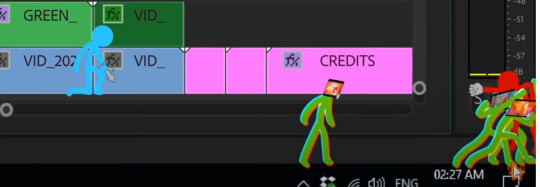
So, to those of you that don't know what I'm talking about, I noticed that Blue just kind of waits there for a moment before going in to help Red. I wondered why, because throughout the series, these stick figures are shown to have really quick reaction times in these kinds of moments.
But then it hit me; it's about personality.
So then I decided to do a deep analysis of Blue's character, which is probably going to be the first of five parts (maybe even more) where I deep dive into everyone's traits and flaws and whatnot.
-
Here goes...
So, we've seen Blue as more of the pacifist assistant. He likes plants, netherwart, potions, and cooking. You don't really see him being the first to instigate something, or the star of a fight. Heck, even in the Raid episode, it's more focused on Yellow and the command block staff than him.
But we do see more of an aggressive trait as well, in that sometimes, he acts without thinking.
LIKE THE LAVA. HE DIDN'T EVEN THINK ABOUT IT AND JUMPED INTO STICKING LAVA. WOW. WOWOWOW. WOWOWOW.

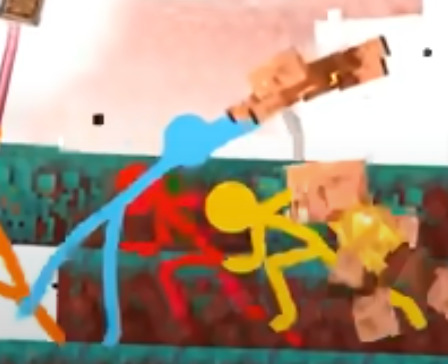

But, what startles me, is that even though he'll self-sacrificially jump to save someone, and follow someone without thinking, and needs someone to ground him (usually Yellow), there are also times where he just freezes. Like in the Influencer Arc. He freezes when Red is getting beat up by the clones, before shooting at them. His brain takes a second (hehe) to catch up.
And here, too. Yellow is making a plan, where Blue's emotions are overriding any sort of thought.
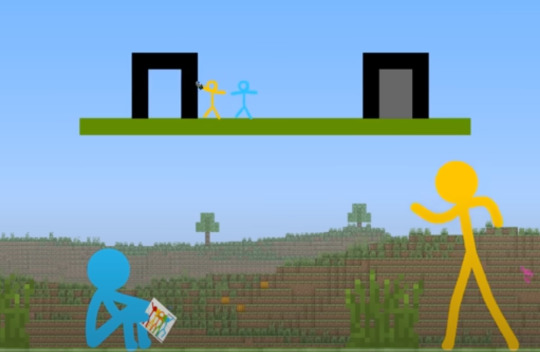
...BUT AT THE SAME TIME, we also see those two things coalesce together for the better. We see him take action instead of freezing, and actually think about what he's doing as well. And this moment in the battle against the King goes kind of unnoticed, in my opinion, since there were so many hard fighting sequences and emotional stakes.

LIKE WHAT THE STICK. HE LED AN ENTIRE VILLAGE INTO WAR, AND THEY WERE ACTUALLY ABLE TO HOLD THEIR OWN AND CAUSE THE PILLAGERS TO RUN AWAY WITH ABSOLUTELY NO CONTEXT OR PRIOR TRAINING (albeit before they came back with the evoker and illusioner)
But we also don't talk about how much he assists everyone else. Like here. Green would have gone flying twice if Blue didn't have the presence of mind to brace him.
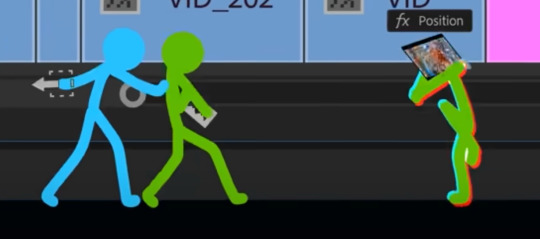
I saw a comment under the video calling Blue the MVP of the fight against Greenscreen. And while I do harbor the opinion that everyone contributed a lot to the win (and don't really agree with the comment, as Green, Yellow, Red, and Second contributed so much too), you can't deny that he assisted everyone frequently during the fight, and was a key part of success.
Blue's character arc is something we don't really talk about much as a fandom, but there are truly some moments which are, like, really cool.
And the most important one of all, of course.
Bluecifer "Elsa" Blonde. (my fanmade name, tell me if u like it!)
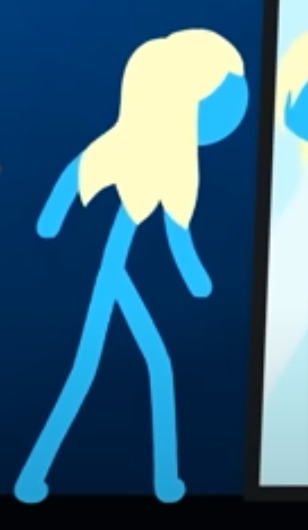
#slayqueen
EDIT AS OF 9/24/24:
There's also something else I noticed. Blue is shown to be able to keep track of a lot of things at the same time as well, like the positioning of his friends in a battle, and enhance them properly. He knows exactly what they need and can deliver it to them.
In the Witch, when he arms himself with potions and starts fighting, he has the presence of mind to turn his friends into animals that can stop the witch. For example, when Red is about to strike, he turns him into a golem for it to pack more punch. It's truly amazing, because he was able to pinpoint that that was about to happen before it did.
And even with himself, when the witch started shapeshifting, he did too. He knew exactly which mob would combat which, and he might have won if he hadn't run out.
#ava blue#fan analysis#analysis#avm blue#ava influencer arc#influencer arc#animator vs animation#animation vs minecraft#animator vs minecraft#color gang#green screen#irislunace#siciria analyzes
170 notes
·
View notes
Text
Dissecting the clues in Slam Dunk's final cover image

We love to speculate about what happens to the characters beyond where the manga stops. A lot of it is pure fan conjecture, but sometimes Inoue does sprinkle in some clues. A year ago, a fan by the name of Strawberino shared a really interesting analysis about the future of the team on a different platform using clues in the cover image for volume 31. She told me eons ago she wanted to type it all up and share it, but then never got around to it (because: life) so I decided I’d just tidy up her notes and do it for her - credits for the following analysis go entirely to her of course.
So here we go, Strawberino's analysis of “who will replace Akagi and play Center for Shohoku the following year”:
Volume 31’s cover is a photo of Shohoku team practice after events of "10 Days Later", when Sakuragi returns to the team post-rehab. You can tell because his hair is longer. Akagi and Kogure are not in team uniform (they retired from the team to prepare for exams) but Mitsui is, meaning Sakuragi returned to the team before end of his first school year. Now it looks like they're playing a 3-on-3 practice match with Team Red being: Sakuragi, Rukawa, Yasuda and Team White being: Miyagi, Mitsui, Shiozaki. The teams' composition is reminiscent of chapters 134 & 135 where Sakuragi (Center) went up against Mitsui (Center). Based on this you can kinda assume Sakuragi is learning to play Center in addition to PF. Or you could have a simpler explanation for the team composition: Sakuragi and Rukawa are put on the same team so they're forced to learn how to work together.
Some fans might saying “you’re reading too much into things” but to that I say: Inoue has long been known to be extremely detailed oriented. An example: in re:source (the visual guide/companion book to The First Slam Dunk) Inoue was so particular about Sakuragi's hair that he left notes for the animation team detailing how long the hair should be and what texture it'd be at that point in the story.
And although Sakuragi taking over as Center isn't exactly the most shocking piece of news, it's still cool to see compelling proof of this and to think that Inoue probably has thought about what happens for Shohoku the following year ;)
#slam dunk#takehiko inoue#sakuragi hanamichi#anime and manga#rukawa kaede#mitsui hisashi#スラムダンク#overthinking#fan analysis
75 notes
·
View notes
Text
The two sense no body asked for:
I heard someone ask what the supernatural writers could have possibly intended for the metaphor of hunting and monsters if not it being queer and this is my guess.
I think (though I do not know the writers themselves or their other works) what they were intending. Here in America there is a very specific subculture that hunter culture in supernatural is very reminiscent of. The beer chugging, flannel wearing, gun slinging, toxically masculine, veteran-majority, blue collar, red-blooded subculture of Americans. I live near a lot of people a part of that subculture and grew up with them as an outsider (being a person of color). And one thing that is very common with this group is a hatred of difference but also higher education. Because higher education is seen as indoctrination and a way of taking “their people” from their way of life.
Now: the Winchester family.
A gun slinging, veteran father who wants his sons to follow in his footsteps. Who kick his son to the curb for wanting and pursuing higher education. Who got on Sam’s ass for not wanting that life.
Now we have Sam, the son who is said from the very beginning as “different” because he didn’t want that life and the show makes it a very clear thing that Sam is in the wrong for not being a hunter, for not being one of them. Sam is also not the stereotypical masculine guy, he did theater, he drinks smoothies, (yes that seems like a stupid thing but the bar is in hell because you’re feminine for caring for hygiene and among other things because why not, gotta love America) so he stands out against the hunter world a bit more.
But that isn’t all that makes him different. Sam has demon blood. Sam has psychic powers. Sam is not only not one of them but he is the “enemy”. Even Dean stated in season 4 “if he wasn’t his brother he would hunt him”. Sam was directly compared to Lucifer, the angel that rebel against his father (and also the world and life John represented). Sam tries to do good with his powers and ends up being tricked into raising Lucifer. Becoming an agent of evil. The character that is labeled as different for not wanting that lifestyle for a long time is shown as an agent of EVIL.
And not only that in season 5 which (correct me if I’m wrong) was the intended show finale. Sam sacrifices himself. And then, after the plot that the writers (for the most part) wanted happened and the show ended up continuing, Sam was given little to no plot lines, his psychic abilities forgotten. Made a side character, because his intended purpose was fulfilled. At least for the first couple of seasons before the show began to leave the writers control (Castiel, season 6+, queer audience, etc.) and before main writers began leaving, I believe Sam was meant to be a warning against being different or “one of those”. This is my take (sorry you had to read the Bible to get it)
And don’t even get me started on how Dean plays in this situation I have purposed—
#supernatural#spn#spn fandom#sam winchester#spn writers#fan theories#fan analysis#john winchester#fuck john winchester#text post#dean winchester
38 notes
·
View notes
Text
While doing some research for the upcoming chapter of my TGAMM fic, I learned that apparently acorns are considered lucky.
That alone is pretty neat. But… then I remembered Aida’s necklace.
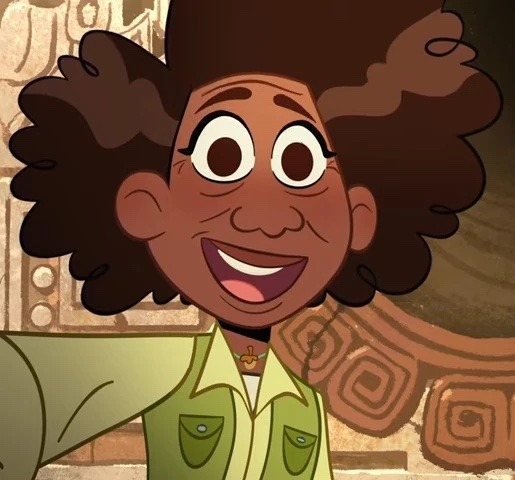
Sure, it can be seen as just her love of nature, but maybe she believes in good luck charms as much as Scratch does.

#the ghost and molly mcgee#tgamm#adia williams#scratch the ghost#scratch mcgee#todd mortenson#tgamm spoilers#fan analysis#luck charms#acorns
22 notes
·
View notes
Text
I thought other folks would like this and I had to share just for this line: "after a disastrous rock-climbing excursion with an emotionally intelligent himbo".
Enjoy some Farscape textual analysis in this year, 2025!
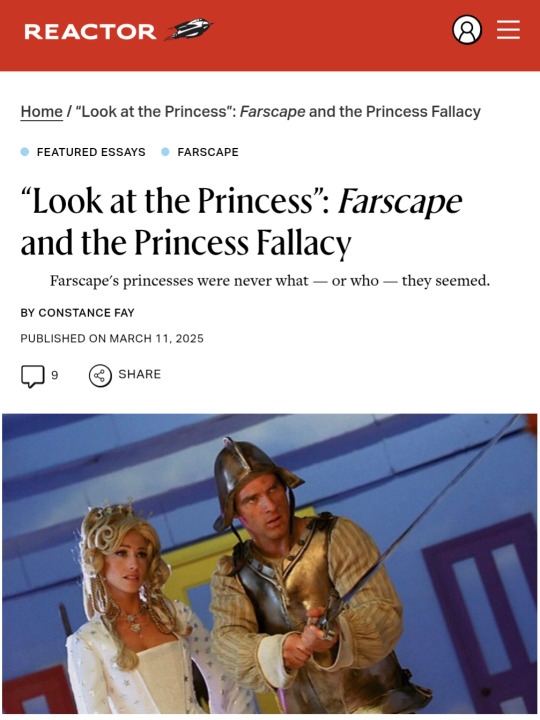
https://reactormag.com/farscape-and-the-princess-fallacy
#farscape#farscape is 25 years old#fan thoughts#lit crit#textual analysis#fan analysis#it's John#he's the princess
28 notes
·
View notes
Text
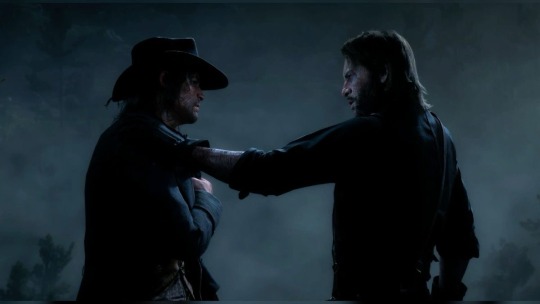
Are John and Arthur “Good” People? (An RDR Analysis)
A common comment I see on a lot of RDR posts is that, at the end of the day, John and Arthur are simply bad people. Usually, these comments can be seen in game clips where the player controlling Arthur has him do something drastically evil, such as mass murdering an entire town, just for fun. However, these also exist under posts that are meant to praise the characters of the game, showcasing their redemption arcs and appreciating how far both John and Arthur grow from the beginning of the game series. First, I think it is important to note that for the sake of the game being interactive, players must be able to have autonomy over what either John or Arthur do. Player autonomy within RDR is meant to serve as a world-building mechanism that unites the player with the intricate environmental designs, side-character interactions, and atypical lifestyles of John and Arthur. The more one explores, the more immersed they become with the characters they play as, and this makes the eventual deaths of both protagonists even more impactful. Yet, some players instead utilize open-world freedom to harass and harm numerous NPCs for seemingly no reason. Sure, Arthur and John can be made to rob random houses and beat up women in saloons, but this is not representative of the canonical story Rockstar is portraying. This leads to the other point I brought up, which is that many people argue that John and Arthur do not technically redeem themselves, and I want to dissect this by explaining what RDR teaches players about what it means to be a good person.
To tackle this complicated question, it is essential to recognize that the world Arthur and John come from is not a world that RDR players have ever lived in. The Wild West as a whole is essentially its micro-society that died about over one hundred years ago, and rather than going to war with other countries, Wild West “gangs” go to war with rival groups that hold ideologies the other finds to be immoral or corrupt. This world has its own traditions, power dynamics, borders, and way of life that can be defined by two main concepts: anarchy and poverty. Yet, like all political ideologies and lifestyles, some issues and hypocrisies arise from these values. Despite being anarchists who view the rich and the government as the world’s true enemies, micro-governments form within the “gangs” of the Wild West that develop into an almost cult-like reality that all people knowingly or unknowingly accept. Dutch Van Der Linde is a prime example of this. He rescues children, veterans, people of color, and outlaws who often themselves are victims of capitalism, racism, and American corruption and takes them in as his “children.” Dutch can be analyzed as the gang’s leader, and he ultimately sets up a society where he has loyal advisors, such as Hosea Matthews, but at the end of the day, only his word is to be followed, despite any doubts or opposition. Additionally, despite giving those living in poverty food, shelter, “education,” and a sense of community, Van Der Linde isolates members of his gang from the outside world through unique manipulation that eventually has the gang turn against one another.
Even though Dutch claims he opposes the structure of the United States government and the way it is often a form of evil, he does little to fight against the system. Instead, he uses it as an excuse to gain power in his way and steal from those he feels as a whole wronged him, but he sends loyal gang members to do the dirty work for him. This leads to a vicious cycle of poverty perpetrated by both Wild West gang leaders and the government itself; to put it simply, the government does little to help those born into unfortunate circumstances, poverty, families of color, and more. It then deems these people to be “inhuman,” causing those same people to flee to whoever will accept and guide them. Then, when the government gets wind of what those “inhuman” people are now up to, they demand that these lifestyles get abandoned and destroyed, but still fail to provide an alternate lifestyle of help to get people on the right track. This isolation and lack of empathy from those of governmental power both cause these Wild West outlaws to exist in a balance of stark independence and cultish loyalty to those who offer a sense of belonging. Thus, a vicious cycle continues.
Yet, even with menial knowledge of the Wild West lifestyle, it does not take long for players to get a sense that John and Arthur are two strong examples of what morality within this dubiously structured world can be analyzed to look like. The only times we see John and Arthur be “cruel” (outside of TikTok gameplay clips from teenage boys…) is when they want to say or do something mean to somebody. For example, Arthur demeans Sadie by calling her “woman,” but this is because he feels she is claiming to be better than other people in the camp because she does not want to cook. At other times, he uses the term “woman” or similar derogatory terms when trying to assert dominance or intimidate others. Arthur does this because of the loyalty he has to Dutch; he believes he is acting how he must act to provide for the gang, thus making Arthur’s motivations clear: loyalty. No matter what, Arthur is loyal to the people he perceives to be his family and saviors, especially Dutch. When Arthur is not working and encounters people he has genuine conversations with, we see the kindness, empathy, and creativity that Arthur possesses, even if Arthur himself downplays his own beautiful characteristics. Even if you always choose to antagonize gang members, you will not lose honor as a result of it, implying the gang understands that Arthur has and always will mean well. He openly expresses that he believes in equality, and we see through his interactions with women, people of color, and even those with alternative lifestyles, such as Charles Chatenay, that he respects people if they follow their hearts and lack impure intentions. This is why Arthur resonates so heavily with Eagle Flies, who wants to start a war against the United States Army because of their treatment of his tribe, while Arthur despises Micah who only serves himself.
John and Arthur are similar to one another. One thing to make note of is that they symbolize a sibling duo that grew up in chaos and processed it differently. Arthur, who is older than John, takes a much more “loyal dog” approach to his upbringing. Since Dutch and Hosea took Arthur in and provided him with the paternal comfort he always sought even before the “Van Der Linde gang” was fully established, Arthur dedicates his entire life to the two. He is scarily dedicated to serving them, both because he adores the gang as a whole and because he has not formed an identity outside of Dutch’s hold. Dutch does this on purpose, essentially grooming Arthur to be an unbeatable bodyguard, and takes advantage of Arthur’s desperate-for-praise nature and gradually exposes Arthur to more and more violence until it is just a factor of his life. However, John juxtaposes Arthur’s fervently faithful nature, as he is younger and joined the gang after it was a bit more developed. John shows a much more defiant and anti-authority streak than Arthur does. While Arthur does value alone time as a means of reflection, John shows a tendency to make choices for himself, even if this is at the expense of other people. Yet, there is something almost childish about John, even when he’s robbing someone or being threatened by the government. In the face of danger, he will make snide remarks, and while being stubborn, he will display an almost silly sense of opposition to whatever he dislikes or does not want to do (think about how he was acting while being driven in the car in RDR1). Yet, deep down, John has a similar sense of loyalty to Arthur, and this is where their two arcs truly divide; Arthur is causing him because of his unconditional loyalty to a decaying cause, while John wants to be better for his wife, Abigail, and son, Jack, but does not know how to be. It is very evident that John loves Abigail more than anything. Around her, his defiant, angry nature will subdue or disappear entirely. Abigail, who also grew up in unfortunate circumstances and turned to prostitution as a result, understands who John is at the core, and he understands her. She is the one person John, in his own strange way, is vulnerable with. He lets Abigail slap him if he says something rude, performs gestures of love as a means of apologizing to her, and goes to Mexico while it is in the midst of a bloody civil war to take down Bill, Javier, and Dutch after the gang disbanded all to secure her freedom from government captivity. John’s love for Abigail is so important because he is somebody we see resent how he gets frequently used like a pawn by people in power, but with Abigail, he accepts that sense of authority and respects her because of it.
So, if John loves Abigail so deeply, why did he run away after the birth of Jack? Does this not make him a deadbeat father and a bad man? At first glance, John’s relationship with Jack does appear to have a level of unhealthiness to it. Not only did he miss a year of Jack’s life, but as he gets older, John tends to put down Jack’s less “masculine” interests. While this is wrong to do to Jack, it is difficult to claim that John’s actions were meant to be purposely cruel. This is somebody who knows very little about love, family, and fatherhood. Sure, John gets glimpses of these realities through the gang, but the gang is still made up of lots of people who are coping with traumatic pasts. The gang, who are now all adults, understand the reality of their situation and the people who are in the same circumstances as them, but John knows that Jack deserves better than the dwindling life of a Wild West outlaw. Yet, John does not know how to obtain this life for his son. The only fatherly figures he has had raised him to be but another player in this violent world, and otherwise, John has lacked positive and authoritative male role models in his life. So, John panics and disappears not just on Abigail and Jack, but on the gang as a whole. Upon his return months later, almost everybody welcomes him back with open arms; even Abigail. She understands that John fled not because he is unloving, but because he is too loving and fears he will raise a son that will turn on as hardened and unfortunate as him, and that is the last thing John wants. Even though they fight and sometimes fail to communicate efficiently, John and Abigail know that deep down, they mean everything to one another, and no matter how idiotic John acts, it is out of fear, not pure cruelty.
Both RDR games end with the protagonist’s death which symbolizes a cycle of violence being broken, even if it is a more gradual process. John and Arthur have spent their lives essentially in exile. Their biological families and home country have abandoned them in numerous ways, and this resulted in an outlaw lifestyle that is now being forcefully put to an end by the very same government that catalyzed its creation. They have mastered how to fight for what little they have and how to steal from upper-class Americans as an act of retaliation, but all this does is trap Arthur and John in their angry pasts. Rather than Dutch helping the two get back on their feet, he instead encourages John and Arthur to fight and take from the same society that displaced them. Yet, this brutality does nothing but make the two groups hate each other more and more, especially as Dutch’s plans began to change from simply robbing the rich to becoming the very force that enables poverty patterns to continue. John and Arthur begin to recognize and oppose this because of the empathy both possess, and they start to resent Dutch’s changing ways. Once again, we do not see either man kill in cold blood, seek to harm the innocent, take enjoyment in murder, or act in self-serving manners. From the angle of the Wild West being its own society, John and Arthur have the roles of being military men who finally see the extent of the damage their world has caused, even though they tried to convince themselves that their world was different. Thus, the cycle breaking begins. After being diagnosed with tuberculosis, Arthur decides to spend the time he has left helping strangers with an array of problems and assisting those whose lives he feels he has negatively impacted. One of Arthur’s final moments is him either going back to get the money that will symbolize Arthur reclaiming a sense of personal power in the world that is crumbling around him or him helping John with one final major escape from the life of violence he was born into. This is after Arthur already made numerous decisions to save John from danger, whether it be a wolf pack or a prison island, because despite Arthur’s criticism of John’s actions, Arthur knows that deep down, John is not somebody who acts with the intention to be bad. Seeing this goodness and selflessness from a man who grew up in the same life as himself, John continues to try and be a different person for the sake of protecting his family. John tries hard for this, and he eventually builds a ranch for him, Abigail, and Jack to live on together and search for a sense of normalcy, which Abigail appreciates more than anything.
However, progress is not linear. Despite John working hard to outgrow the only lifestyle he ever really knew, he cannot fully escape the trauma and chaos that trails him. This is partially due to him occasionally slipping back into his old ways, especially in the face of danger, where he continues to fight rather than aim for peaceful means of mediation, and partially due to the American government doing what it does best: fail at true justice. Even though John has started to create a new life for himself, the government ignores their role in the development of the Van Der Linde gang, instead kidnapping John’s family years later and only agreeing to release them if John can take down Dutch, Bill, and Javier. They send him into the war-ridden Mexico region with minimal resources, assistance, or guidance, causing John to have to do what he used to do with Dutch, which is kill, meddle in other people’s battles, and get taken advantage of by more powerful forces. Once again, John only kills because he sees it as fighting for the greater good; a reality where he and his family can be free and his past can be eradicated. He does not take joy in fighting for or against the Mexican government, he is simply working with what little he has to save his family. Even then, we still see John’s heart through his care for Luisa, Bonnie, and even strangers that he assists on the road. Despite this and performing what the American government asked of him, they still gun him down at the game’s conclusion, which John accepts rather than evades because he wants his family to settle down and live to become something better, even if he is not there to see it.
Even though RDR1’s epilogue shows Jack to now be angry and hurt as well, there is still something inherently different about his life compared to that of John and Arthur. Jack’s dad was present in his life, even if imperfectly, he had a mother who loved him dearly, even though we know she passed away a few years after John did, and Jack has an understanding of the foundation of a life built around love and family. It is possible that Jack may have the same streaks of violence as John did, but for the first time, the Marston lineage is seeing a glimmer of hope that has seldom been seen before, all because one man dared to stop fighting against the past and instead fight for a brighter future, even if not for himself. Now, does all of this backstory and explanation pardon everything Arthur and John have done? Absolutely not. No human being is capable of getting through life without hurting people, involving themselves in situations they should not have a part in, only trusting perfect people, or making bad choices in the face of unfamiliarity or turmoil. However, it proves something greater than simply stating if John and Arthur are “good” men because oftentimes, people grow up in worlds where goodness is not an apparent reality. Yet, what can be said is that Arthur and John tried to better and fight for a greater, purer good, even at their own expense. Sure, their pasts cannot be eradicated, and they cannot change what is already done, but what they do have power over is how they shape the rest of the time they have left. So, they do what others have rarely done for them and take a gamble on embracing love to both change for the people they cherish and to be changed by those who love them.
All countries and communities are united through collective acts of violence, war, pride, and enabling of cruelty. The United States government and the Van Der Linde gang are both guilty in that regard. Yet, if the absence of all imperfections and the capability for one to escape the harsh circumstances they exist in is what makes somebody good, then nobody would ever be able to respect themselves, because, in one way or another, everybody hurts and gets hurt in return. What makes a true difference, however, is the ability to acknowledge one’s shortcomings, whether or not these are intentional, circumstantial, or implicit, and utilize that realization to push not to become perfect or guiltless, but better than before. At the end of the day, that urge to push for a gentler way of living for the sake of bringing peace to both yourself and who or what you love the most is what makes Arthur and John good people. Deeply complex, flawed, regretful, and troubled, but good. If everybody valued goodness as the desire to do better rather than fight against an unchangeable past, maybe the world as a whole would strive for decency and ultimately unite us all.
~~~~~~~~~~~~~~~~~~~~~~~~~~~~
Thank you for reading! This is my first time posting on Tumblr, and I am looking forward to posting and engaging with more commentary of RDR. My essay is not proofread, so I apologize for any mistakes. :)
#red dead redemption 2#arthur morgan#john marston#jack marston#abigail roberts#dutch van der linde#red dead fandom#red dead redemption arthur#red dead redemption community#red dead redemption fandom#rdr2#rdr1#rdr2 community#rdr2 fandom#arthur morgan rdr2#rdr2 dutch#rdr2 arthur#rockstar games#wild west#hosea matthews#red dead redemption two#rdr fanart#fan analysis
32 notes
·
View notes
Text
analysis of the soul contract
(if you haven't seen the translation for that yet, look it up or look at my original translation post here)
Major spoilers for the entirety of Gravity Falls and also MAJOR Book of Bill spoilers for like the whole thing so go look at that first, ok? (Seriously, this post makes more sense the more you know about the content of the book...and the series)
**if i make any mistakes within this analysis in terms of existing lore or there's something i should add, send me a dm/reply to the post!! or just rb it with the information lol
Under the cut because it's really long (but contains information that I believe to be very important to the overall lore!!)
There are three really interesting things hidden in the translation for the soul contract that I actually NEED to talk about because I haven't really seen them discussed anywhere else?? (yes it's divided up into sections, don't worry)
The Soulmate Passage
The soul contract passage starts off with Bill's lawyer talking about all of the things that they can legally do with your soul, but then they go into the idea of soulmates, and something about this passage feels eerily familiar.
YOUR SOULMATE WILL NOT RECOGNIZE YOU AND WILL WALK RIGHT PAST YOU ON A COLD AUTUMN DAY, NEVER MAKING EYE CONTACT, NOT EVEN PROCESSING THAT YOU GAVE EYES AT ALL. NO AMOUNT OF INTERACTION WILL MOVE THEM TO A PLACE WHERE THEY CAN REMEMBER, IN FEELING, THE THOUSANDS OF LIFETIMES YOU HAVE ALREADY SPENT TOGETHER, EACH TIME CHOOSING WHATEVER FORM WOULD KEEP YOU CLOSEST LIKE OTTERS HOLDING HANDS IN A TUMULTUOUS RIVER. YOU WERE BIRDS, YOU WERE TREES WITH ROOTS ENTANGLED, DRINKING IN THE SUNLIGHT TOGETHER. WHEREVER WE GO NEXT, WHATEVER YOU CHOOSE, I WILL ALWAYS BE RIGHT WITH YOU.
(sorry for the long quote but it's kind of important here)
He gets way too specific here, even going into the first person to begin talking about how he will always be there for you. In the Book of Bill, the main concept is that Bill is attempting to win over the reader in order to convince them to make a deal with him and, therefore, release him from the Theraprism, and he seems to be doing the same thing here with the reader.
However, in my opinion, because for the majority of this he talks about you using third person pronouns, it can be somewhat inferred that he is talking about himself and his soulmate. Not specified who that is (totally not the canonically divorced couple), but it can definitely be interpreted as him doing some introspection.
The references to loss of memory could also be a reference to how Stanley defeated Bill by wiping his memory, and how up until the last minute, Bill believed that he was back in Stanford's mind.
"THOUSANDS OF LIFETIMES" could be a reference to the trillions of years that Bill has lived and all of his exes, as well as how in every single one, he was the one getting broken up with. And, also, the many other muses that he (unconfirmed) may have had.
THAT'S DONE, BUDDY, CONGRATULATIONS! YOU HAVE CHOSEN BILL INSTEAD.
Moving on!!
2. Bill's control over souls
**As far as I am aware, this is the first time in the canon that we see what control Bill has over the souls that he collects.
GOOD GOD! THE THINGS S I’VE SEEN. ME_ WHO AM I_ OH_ I_M BILL_S PREVIOUS LAWYER_ HE PUT MY SOUL INTO A QUILL PEN SO I CAN WRITE HIS LEGAL DOCUMENTS UNTIL THE SUN SNUFFS OUT LIKE A CANDLE IN THIS SICK UNIVERSE_ SPEAKING OF WHICH_ BILL RESERVES THE RIGHT TO PUT YOUR SOUL INTO AN INANIMANT OBJECT_ A STRANGE CREATURE_ A CONCEPT_ A SENTENCE_ A TASTEFUL BUT RUSTIC MASON JAR WITH WILDFLOWERS IN IT_ IF AT ANY POINT YOU WISH TO HAVE VISITATION RIGHTS WITH YOUR SOUL_ YOU WILL BE SWIFTLY DENIED_
According to this, Bill's control over souls when signed over gives him the ability to, (as first shown in Sock Opera, but in a more limited way) put souls into other objects, take them out of your body. While put in a more simplistic way in this passage, it is clear that he has a lot of control over souls, and, when signed away, may have the ability to do anything with one that he wants.
However, going back to the mischaracterisation present in the first quote where it sounds as if Bill is talking, now that we know it was his pen, it is clear that he also has the ability to control the souls to do what he wants.
The time limit on how long these soul contracts last for is indefinite, as Bill's soul lawyer himself says.
*Side note: it is revealed, in relation to souls, that the human soul is 21 grams.
3. The afterlives of the universe of Gravity Falls
So, later in this passage, all of the places that you can go to after you die are revealed. This is mainly important because you can see more of the in-universe lore, but also because we can see more of what Bill Cipher was hoping to happen when he invoked the Axolotl at the end of the series.
YOUR SOUL MAY BECOME FRACTURED AND PLACED INTO DIFFERENT OBJECTS_ THIS HAS NO PURPOSE AND WILL NOT RESURRECT YOU IF YOU DIE_ SIGNEE HAS FORFEITED ALL RIGHTS TO ANY AFTERLIFE_ INCLUDING BUT NOT LIMITED TO HEAVEN_ HELL_ PURGUTORY_ BIG CORNER_ FLOW STATE_ THE DREAM HOUSE_ THE REINCARNATION PROCESSING CENTER_ AXOLOTL_ S TANK AND CONSEQUENCES HOLD_
A definitive list of all of the afterlives present within universe:
Heaven, Hell and Purgatory
"Big Corner"
"Flow State"
"The Dream House" <- The Dream House could possibly be a reference to either Bill's Dream Realm or Bill's Nightmare realm.
"The Reincarnation Processing Center" <- This is where I believe Bill was hoping to go once he invoked the Axolotl. Going by what he said in the last few moments of Weirdmageddon 3, "A-X-O-L-O-T-L! My time has come to burn! I invoke the ancient power that I may return!" It is clear that he thought he was going to be able to reincarnate by invoking the Axolotl, and by doing this, he would be able to escape going to hell.
"AXOLOTL" <- This is a reference to summoning the Axolotl when about to die, such as what Bill did. Axolotls are known for being able to regenerate, so going back to what I said before, Bill probably believed that invoking the Axolotl would give him the ability to reincarnate or regenerate.
"S TANK AND CONSEQUENCES HOLD" I'm pretty sure that this is a longform name for the Theraprism.
More Notes:
The passage is written entirely in the cipher for the journals rather than any of the codes that Bill often uses (alchemic, theraprism, combined, bill's symbols) which I believe ties back to my theory in 1.
While dogs can sense when a soul is missing, cats don't care. Not important, I just thought that was interesting.
anyway, again: if i got anything wrong in this please rb this and add more stuff!! :3
#gravity falls#the book of bill spoilers#book of bill spoilers#fan analysis#analysis#bill cipher#stanley pines#stanford pines#billford#<- mentioned#the book of bill
97 notes
·
View notes
Text
stuff im expecting from season 2
olezha and anton flashback (PLEASEEE)
olya appearing more
diplomator's official appearance
dima's family especially his sisters (at least ONE of them has to be a diplomator supporter i just know it)

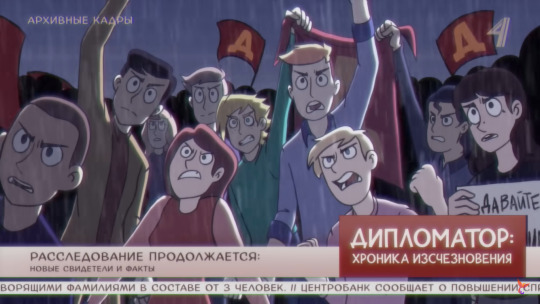
murderer revealed or at least more hints about olezha's murder
zhenya 👀
more psychic battle
conflict between olya and dima
conflict between anton and dima
more actor AU (for trailers and teasers and stuff)
anton's family
#my post#mss#my student spirit#дмо#дух моей общаги#fan theory#theory#fan analysis#analysis#long time no post#i know#sorry#оля душнова#olezha my beloved#олегсей душнов#олежа душнов#антон звёздочкин#антон звездочкин#антон и олежа#дима побрацкий
94 notes
·
View notes
Text
Siciria Analyzes The Most Complex Stick Figures Known To Man (part 2)
Red's new tiktok came out.
We're going with Red next.
Also here's part 1 of SATMCSFTM.
Idk why I abbreviated it.
Or why I linked it.
Welp.
-
Okay, so to start off, most people perceive Red as the youngest of the CG, and the most outgoing. He's the resident animal lover, is sensitive, and in some situations, can be really aggressive and hotheaded.
Like here:
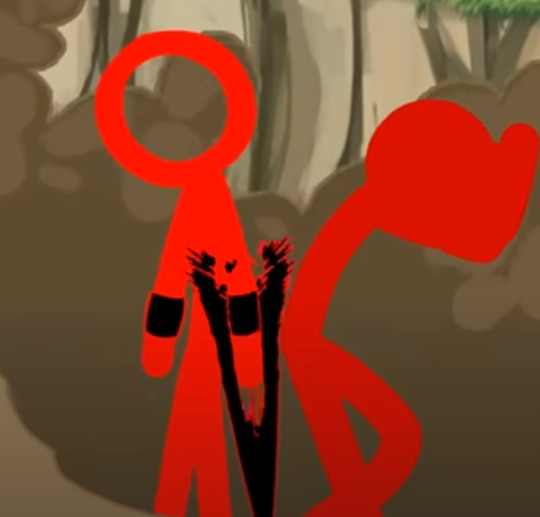
Red went first. He is someone who always throws himself willingly into danger (like Blue in the last part, though Red does it more consistently). With Dark, he went for it not knowing if he could win, but instead to protect his friends. He is the line. He is someone who truly cares for others, and will treat newcomers with the utmost goodness regardless of what he's getting in return. He will go back for them.
This is shown, primarily, in Monster School.
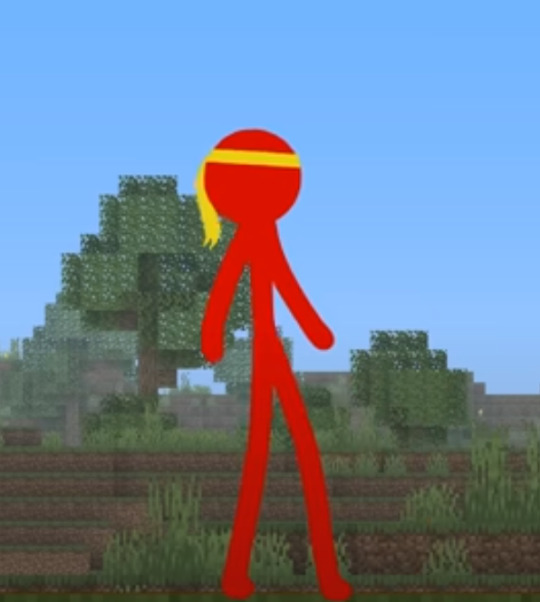
In this scene, he was about to turn back. He was about to go back through the portal. But he saw that his teammates (the ones who bullied and harassed him prior) were in trouble, and still went back for them. We talk about how he went back for them. We talk about it.
But we don't talk about how he must have been feeling, or how much they must have hurt him. And he still helped them despite that. He truly has an extremely strong character, probably the strongest out of everyone, or at least the CG.
AND HE SURVIVED BEING LITERALLY POSSESSED TWICE. TWICE. HOW MUCH MENTAL STRENGTH DOES THIS STICK HAVE.
Okay, now to not state the obvious. this whole "analysis" thing is just me stating the obvious anyway idk why u guys seem to like it
Red is smart.
No, Red is really smart.
And I think we, as a fandom, don't give him credit for it. He's always the one to come up with new ideas, and these ideas seem to work. This is shown, mostly, in the Minecart Race episode.
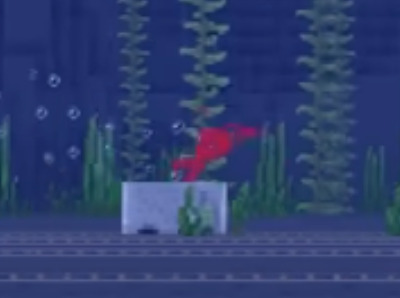
He was the first one to start paddling with his hands.
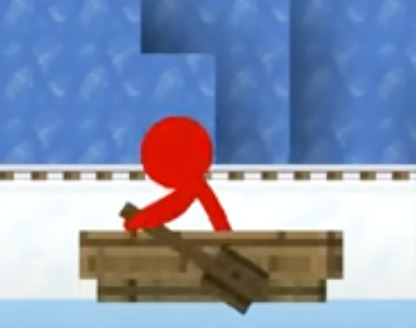
And the first one to boat on the ice.
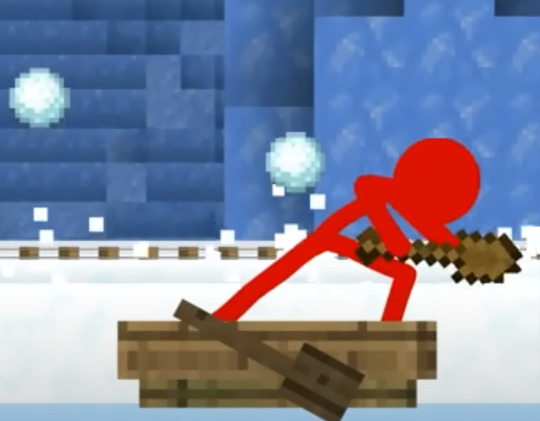
And he had the bright idea to use the snowballs.
Even in the Color Sorting short, he had to know at least some kind of coding or engineering to get all the items to become red items. Come on.
And in his tiktok that just came out today, he does so many different, unique moves. In Green's and even Blue's, it's more repetitive, and shorter (though Blue's dancing skills are unmatched ngl).
An in Monster School, they only passed because of his ideas (WHICH THEY HARDLY GAVE HIM CREDIT FOR). Because it was HIM who understood that the bow needed to be flipped around to shoot properly.
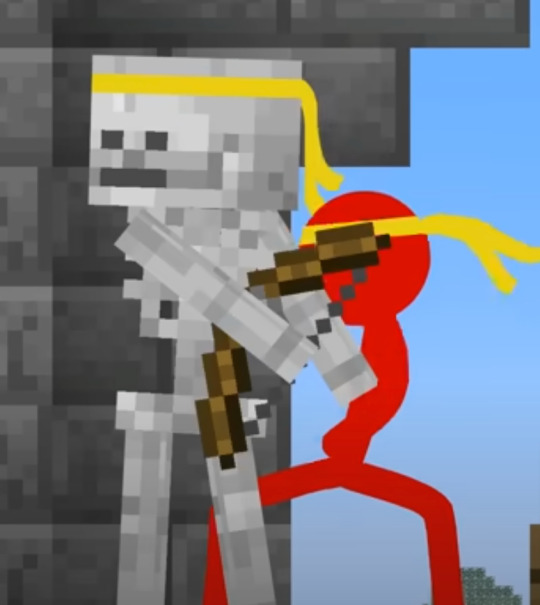
And it was HIM who knew that tickling the Enderman would help.
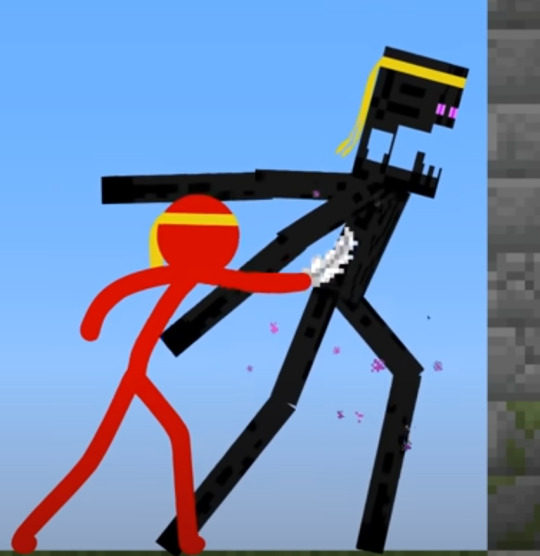
And it was HIM who got them across the ocean to the mountain using the spider.
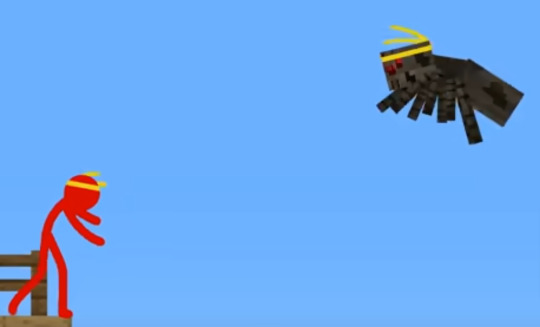
He is someone who can recognize the potential in his teammates, and recognize what they can do in a given battle.
AND WHAT DOES HE GET FROM THEM? NOTHING. NOTHING. HE GETS BEAT UP. HE GETS STICKING BEAT UP.😭😭😭
So in summary...
WE NEED TO TALK ABOUT RED MORE.
(I honestly learned more about Red doing this. It's kinda fun ngl).
#ava red#animator vs animation#irislunace#siciria analyzes#animation vs minecraft#animator vs minecraft#monster school#color gang#fan theory#fan analysis
121 notes
·
View notes
Text
Inoue tells us Sakuragi goes on to have a great basketball career via another manga
As most of you know, Inoue Takehiko has another manga called REAL that features wheelchair basketball. He has a habit of dropping Slam Dunk Easter Eggs in REAL (eg. Kogure cameo on the bus) but here's a pretty interesting panel that concerns our favourite redhead-
The character is reading a basketball magazine and the page depicted is an ad for tryouts and it says ...明日の花道はキミだ!!("...you are the Hanamichi of tomorrow!!"), indicating that Sakuragi must've gone on to have a stellar career in basketball to be even mentioned in this way.
This is of course great news because it means Sakuragi made a proper recovery from his back injury :) I also kinda love that he's known as Hanamichi instead of Sakuragi. Probably became a fan favourite and at some point said (with a thumb jerk at his own face) "just call me Hanamichi!" I like the idea that he didn't let it all go to his head.
Source: this article that hyperanalyses who might have actually been the IH champion that year given that every single team that was depicted in the manga was eliminated as a possibility by Inoue.
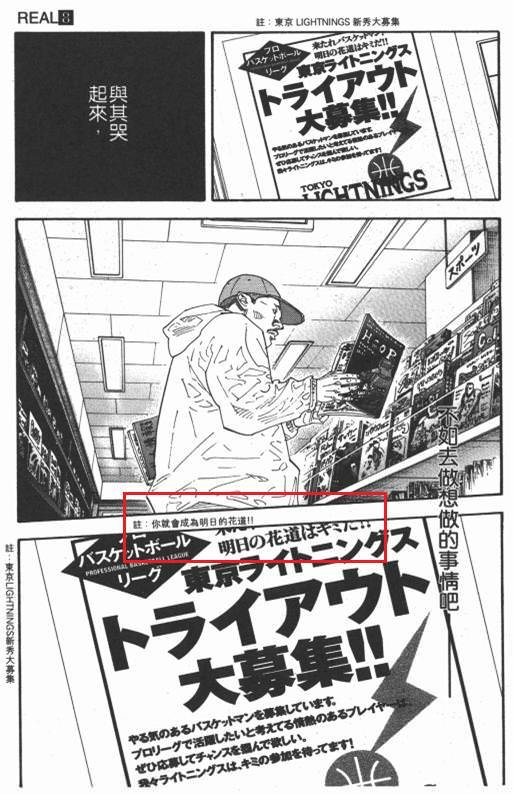
31 notes
·
View notes
Note
I guess I’m one of the weirdos of major minority that actually likes Nick and Rose together. I used to be a huge Nick and June fan and if circumstances were different, they might have a shot. However, Nick has been living in Gilead for years. He went from a driver to a commander, which means he has to be involved in some shady stuff to put it politely. Yes, he’s absolutely helped June and saved her numerous times, but his life is Gilead. Gilead gives him a lifestyle he wouldn’t have if he was in Canada or the United States before Gilead. June is rightfully angry when she feels she is betrayed but if Nick wanted to hardcore betray her, he could have sold her out and shouted that she was in the house when Wharton came in. Nick is trying to survive, keep himself and his pregnant wife safe and keep the trust of fellow commanders. I totally get June’s feelings of betrayal and heartbreak, but honestly what did she expect? He’s done everything for her without question. Since he’s been in Gilead for so long, he’s been indoctrinated into their way of thinking. Being a commander now, having that type of power and position, it would be hard for him to stay the same person he was when he and June first met. Nick is constantly surrounded by Gilead propaganda and rules. Nick has had one foot in the Gilead camp and the other foot in the betray everyone who trusts me in Gilead including my pregnant wife to help June camp. Eventually things were going to come to a head and Nick would have to choose. If he goes to Canada, he has nothing. Staying in Gilead, remaining loyal to Gilead and he had everything - money, power, status, everything. Rose seems to have fully drunk the Gilead kool-aid and fully supports the system. She is what he needs now that Nick seems to have chosen a side. June had to wake up to who Nick really was. He’s become what he is living in Gilead and having the position he now has. Rose suits Nick now. It’s sad what happened and my heart breaks for June. But honestly, the logical part of me asks what she was expecting. Maybe I’m the odd one out but I get why Nick did what he did. I hope he and Rose can work on their relationship (assuming Nick survives the attacks by the Handmaid’s. Hopefully he’s left alone.) I truly feel he and Rose could be happy together. What’s your take on everything?
Thank you for so many interesting insights. You know, I didn’t have the chance to respond earlier, but I’ve been thinking a lot about your post. And I think you’re absolutely right about many things.
Nick has been in Gilead for years, and that in itself was already a “questionable decision.” On the other hand, I believe he got into all of this as an inexperienced young guy who couldn’t even hold down a job—and then it was simply too late to leave.
To me, Nick has always been a Survivor, not someone who enjoys Gilead, but rather someone who kept sinking deeper and deeper into it until suddenly, he was in it up to his waist—if not drowning—and we can only guess what it has cost him.
And June (and honestly, the viewers too) was blind to all of that for a long time, or maybe just refused to see it, didn’t want to think about it. And that’s probably why it hit her so hard now. From her behavior, it seemed like she never really considered that everything she asks of Nick might come at a price—one she wouldn’t like and wouldn’t be willing to pay.
And yes, I understand your point that Rose could be a loyal life partner to Nick—someone who stays by his side, becomes his family. An uncomplicated woman who is always there, not just in stolen moments. Not someone who only appears “when she needs something”… and that’s a really beautiful thought.
But here’s my problem: In Gilead, marriage and having children aren’t choices. They’re obligations. So to me, the fact that Nick has a wife and they’re expecting a child doesn’t feel “romantic” at all—it feels like another survival strategy, another step to maintain what he’s built.
It would be so different if the show had shown us that Nick chose Rose freely, that he loved her and wanted to move on. But that’s not what the creators are showing us. They keep presenting him as a man who deeply and devotedly loves June, a man who suffers for her and who would give everything up if only he could be with her.
You’re right that in Gilead, Nick is somebody—and that if he left, he’d be “nobody again,” as he himself said. But I still believe that he’d give up the status, the possessions, and everything else if it meant he could live with June and Holly. That their crazy dream about “Hawaii” and “Paris” could come true—even if they ended up living in some ordinary town.
But maybe that dream is just an unattainable wish. Because they’ve always kind of existed in two different worlds—even before all this. So yeah, it’s possible that Nick and Rose will end up together, raising their son and staying in Gilead (though how long can that last? What happens when the whole system finally collapses?). Still, I don’t think Rose or their child will ever “replace” June and Holly for him.
June and Holly were his choice—at least as much as it was possible under the circumstances. (After all, they were initially forced to conceive, which makes me all the more glad that June later said Holly was born out of love.) And maybe they were his only real choice in life. They’re the ones he truly wants, and I think that’s one of the reasons so many viewers love him.
His love for June is devoted, deep, passionate—and just as it’s destroying him, it’s also keeping him alive. It probably isn’t healthy at all, but it radiates from so many scenes.
I believe he does care for Rose, that he cares about their child, that he wants to protect them and that they matter to him. But I also feel that they’re more of a duty than a joy—just like when I see June with Luke. And I can imagine Nick being a kind husband who gives her a comfortable life… but I don’t think he would ever be truly happy.
You can see it—his life isn’t making him happy. He has wealth, power, status, a wife, a child on the way… and yet he’s sitting there with a glass of liquor, looking miserable. Maybe if he truly broke away from June—if he actually wanted that—he could work on his relationship with Rose (but as he told her himself, he tried, and clearly it didn’t work). And it seems like that’s not what he wants… and he keeps spiraling deeper and deeper into it.
And I really do want more for him… I want him to be truly happy, to be free, and to finally have what he really wants… but I guess that’s just another one of my wild dreams, because I don’t think the writers will ever actually give us that.
#ask#tht#the handmaid's tale#nick blaine#nick x june#nick x rose#lots of thoughts#fan analysis#osblaine
13 notes
·
View notes
Text


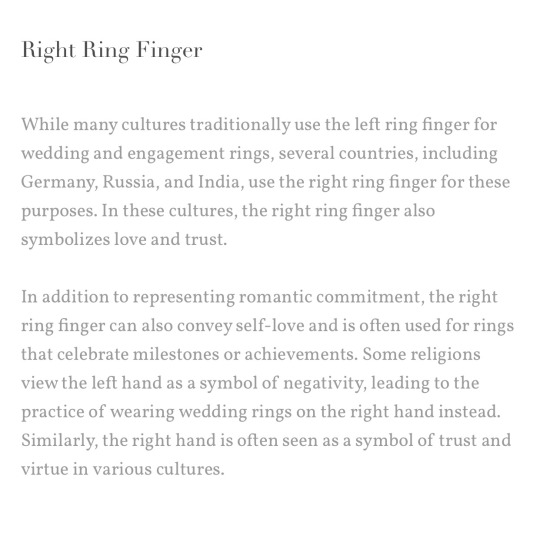
I am so fucked up right now. I noticed he had rings on his right hand and I got curious cause I wondered the meaning of them…this was a devastating development.
Also it’s not said in the article I nabbed this from but Japan is one of the countries …Daisuke is a Japanese name…. Oh ohhhhhgughhh have mercy Devs why did you hide so many things to make me start crying all over again.
39 notes
·
View notes